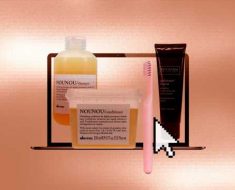Sharon Chuter sees your 40 shades of foundation, and she's not impressed.
Watching beauty's post-Fenty race to launch foundation ranges composed of as many shades as possible, the industry veteran was unexcited by what she saw as a surface-level competition.
"Diversity became a hot topic that every corporation was trying to tick off their list," said Chuter, who has worked for beauty giants such as LVMH, Revlon and L'Oréal. "As a person of color, I was looking at it and there was no depth to it — it was shallow. Everybody was looking for quick wins — shades is a quick win."
So Chuter decided to launch her own brand, Uoma Beauty, inspired by her African heritage yet designed to be inclusive for people of all ethnic backgrounds, with products that can be used and promise to look good on any skin tone. The line is set to launch first at Selfridges on April 17 and then roll out to ulta.com and uoma.com on April 26 and 200 Ulta Beauty stores on May 3. Uoma counts foundation as its star product, but includes a wide assortment of items in the complexion, lip, cheek and eye categories. Prices range from $18 for an eyeliner to $40 for foundation.
Uoma Beauty declined to discuss sales figures, but industry sources estimate the line could do $14 million in sales in its first year.
" a frustration with the beauty industry's lack of inclusion — the industry could decide who is beautiful and who is not. I understand how it feels to be born feeling different — not different good, but different bad. I've always been a misfit," said Chuter. "It was important for me to give my own take on inclusivity and diversity, which is simply allowing people to be their ultimate selves, and something I don't think the industry is understanding. I appreciate uniqueness and stories. Who is behind the shade? What is their origin story and what do they want? And how do we create a world that allows for these different views?"
For Chuter, that involves making broader African history and contemporary culture the inspiration for Uoma Beauty — from tribal print packaging to an eyeliner inspired by (and named after) Cleopatra and eye shadow palettes named after African goddesses.
"Inclusivity is the ability for everyone to turn up as their authentic self," said Chuter. "The fact that I speak about African heritage doesn't mean aren't allowed in that space."
"This connection of inclusivity and authenticity is unique," said Dave Kimbell, chief merchandising and marketing officer at Ulta Beauty. "The approach to the formulation, as well as the messaging and connection the brand will make with consumers, will allow it break through. We're expecting it to be a big success.
The launch of Uoma at Ulta in the U.S. is the retailer's latest move in its efforts to diversify its product offerings. Last year it brought in Juvia's Place, a makeup line with design elements inspired by African goddesses, and launched Revlon's Flesh, which carries an inclusive shade range and products said to work on all skin tones. Despite industry rumblings that Flesh has not taken off with consumers, Revlon Inc. chief executive officer Debra Perelman said on the company's quarterly earnings call yesterday that it was "doing well."
In a saturated makeup market, foundation in particular is what makes Uoma stand out. Rather than roll out 100 shades of foundation, Chuter settled on 51, divided into six groups separated by skin tone and need. The groupings include White Pearl for very fair skin, Fair Lady for fair skin, Honey Honey for olive skin, Bronze Venus for rich tan skin, Brown Sugar for Brown skin and Black Pearl for dark brown skin. Each group of foundation is formulated in a different way based on the different coverage and skin needs of the skin tones in each group — something Chuter says has never been done before.
"Different skin has different needs," said Chuter. "I'd speak to an Irish woman and she'd say, 'My skin has redness and I want sheer coverage,' and a woman of color like myself would say, 'I have spots from hyper-pigmentation that I want to cover,' — it was an 'a-ha' moment. We don't say, 'Let's create one formulation and rollout 100 shades. We took it one step further.'"
Chuter is hyper-involved with product development, ensuring products are suitable on all skin tones — for instance, Lady of Gold, a pearly white shimmer eyeshadow in one of Uoma's Black Magic Palettes, may show up sheer on light skin tones but super-saturated on darker skin tones. If it doesn't look good on all skin tones, "it's not making the cut," said Chuter.
Source: Read Full Article





